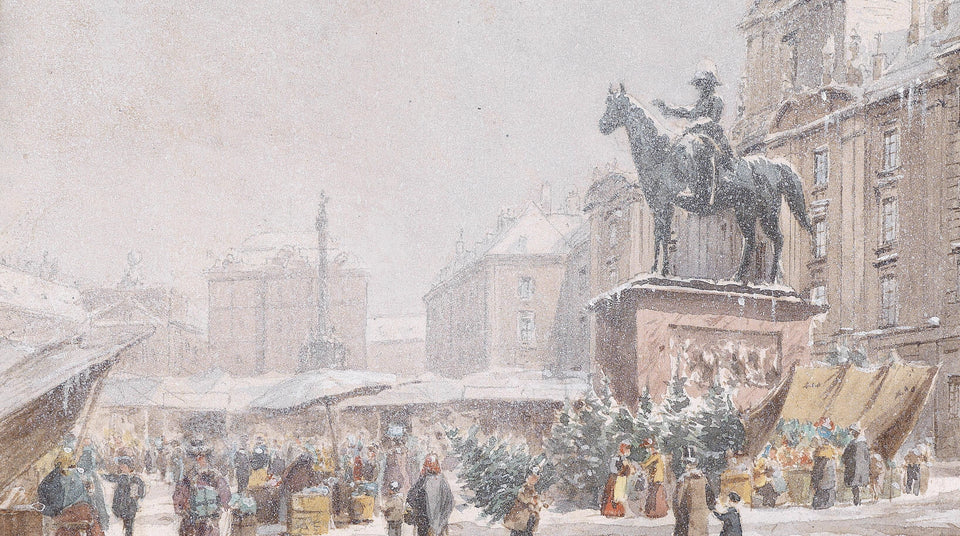Taking Possession of Christmas

In an article published by the British Medical Journal in 2009, Dr. Nathan Grills identifies many ways in which Santa Claus undermines public health.
The author laments that Santa’s gung-ho enjoyment of alcohol whilst distributing gifts on Christmas night encourages neither responsible drinking nor responsible driving, that his continued endorsement of ‘extreme sports such as roof surfing and chimney jumping’ does nothing to mitigate the number of childhood accidents, that his extensive contact with sick children makes him a vector in the spread of infection, and that in continuing to ‘sport a rotund image’ he is clearly ‘a late adopter of evidenced-based behaviour change’. Grills calculates that in view of Santa’s global influence, he need only ‘affect health by 0.1% to damage millions of lives’. For the wellbeing of the public at large - and Santa in particular - America’s Academy of Nutrition and Dietetics recruited the ruddy-faced gift-bringer to raise awareness of calorie intake and nutrition. It calculated that were Santa to enjoy two butter cookies and one glass of whole milk at each American home he stopped at, his absorption of calories would exceed seven billion, and his fat intake exceed 384 million grams. The study recommended that Santa be met in American homes on Christmas night with skimmed milk and crackers. The dutiful efforts of the British Medical Journal and America’s Academy of Nutrition and Dietetics to reform Santa’s behaviour evoke history’s many dutiful efforts to reform his season. A reformation history we can draw on to our own advantage as we seek to take possession of Christmas 2019.
The Christmas merriment familiar to us today owes much to the winter solstice festivities of the ancient world. The illuminations lighting our homes and streets this Christmas originally anticipated the return of the sun, our yuletide feasting was a practical necessity at a time when food was abundant and storage techniques primitive, and the seasonal bunting now lavishly decorating Turnbull & Asser’s UK and US stores formerly celebrated the perpetuity of life. The twelve days of Christmas began as a period of agricultural respite, Christmas carols as pagan musical revelry, and processions of clergy and choristers as pagan parades. Our Christmas standard of humanitarian fellowship is a derivation of Ancient Rome’s seasonal abandonment of caste hierarchy, and our charitable and kinship gift-giving a development from a Roman standard of seasonal gifting that never lost its overtones of extortion.
A boon to the European medieval child and more progressive methods of child-rearing, St. Nicholas’ magical gift-bringing administration replaced some terrifying antecedents. Gone - much to the relief of many a wilful child - were Perchta the Disemboweler, Père Fouettard the whip-cracker and Krampus the demonic child-stealer. Yet, St. Nicholas - patron saint of sailors, Vikings, Russians, thieves, perfumers, florists, haberdashers and children - would himself be banished, replaced by the Protestant Reformation of the 16th century with the gift-bringing ‘baby wrapped in swaddling cloths’. With his infant limbs not best suited to the task of trudging through snow, disseminating gifts and disciplining children who had failed to learn their catechism, the duties of gift-carrying and admonition fell to a host of accompanying male and female bogies, whose execution of justice was at least rehabilitative rather than damnatory. Among the adults of the period, gift-giving was enjoyed without the hovering rod of correction. History records that the Virgin Queen had a ‘sharp eye’ for the value of gifts given her in a season she modelled with lavishness. Maintaining the seasonal observance of her predecessor, James I rebuffed and forbad the Puritan objection that veneration not divinely ordered was unequivocally forbidden. However, Puritanism would eventually have its way, and Christmas was officially dissolved in
England by an act of parliament in 1646. Civil war of a lesser kind ensued, with vigilantes fighting to keep churches open, the Mayor of London tearing down greenery, and ‘parish snoops’ deployed to catch housewives making Christmas pies. Though officially reinstated in England at the restoration of the monarchy in 1660, Christmas had been severely bruised by its association with drunken revelry, and it gradually came to be considered, at home and abroad, the province of the oaf and the bumpkin - suffering further during the 18th century at the hands of the Enlightenment, Deism and European revolution.
Sozzled and denounced, Christmas was to be revived by the efforts of a nineteenth century collective of Christmas literati bent on establishing it as a domestic holiday. First off was Washington Irving, who introduced the Dutch love of St. Nicholas to America, and a flying Santa and sooty presents to the world. Next, William Gilley, who in his poem The Children’s Friend, substituted horses for reindeer, moved Santa’s visits from December 6th to Christmas Eve, and had Santa carry his own bags in one hand, and ‘long, black, birchen rod’ in the other. Santa’s rod of chastisement was finally removed in a poem by Clement Clarke Moore in 1822, which turned Santa into a ‘nonsectarian, genial avatar of grandfatherly benevolence’ that need worry no child. Finally came Charles Dickens, who revived Christmas’s connection to charity, and cast it as a feast of family togetherness and forgiveness.
Though Turnbull & Asser cannot claim, like a nineteenth century New Brunswick merchant, to have ‘entered into a copartnership’ with Santa Claus, it does share his complete commitment to his season. Whether adapting its designs for family members serving in the trenches of WW1, producing handkerchiefs in honour of the family dog - or horse, enabling the likes of Noël Coward, Charlie Chaplin, Katharine Hepburn and Jackie Onassis to float gracefully through Christmas in its silk gowns and night attire, equipping Fred Astaire, Jarvis Cocker or Forbes billionaires for their festive shindigs, or reviving the festive salons of the 1960s for the next generation, Turnbull & Asser has always been at the heart of Christmas action and repose. And there we are for the 134th time, ready to help you take possession of Christmas.


